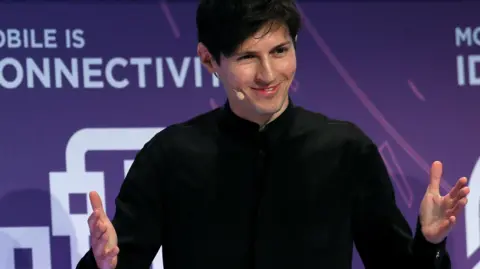Telegram boss banned from leaving France in criminal probe
 Reuters
ReutersTelegram boss and founder Pavel Durov has been placed under formal investigation in France as part of a probe into organised crime on the messaging app, Paris prosecutors say.
Mr Durov, 39, has not been remanded in custody, but placed under judicial supervision, and has to pay a €5m (£4.2m; $5.6m) deposit.
The Russian-born billionaire, who is also a French national, also has to show up at a French police station twice a week and is not allowed to leave French territory.
Mr Durov was first detained upon arrival at Le Bourget airport north of Paris last Saturday under a warrant for offences related to the app.
In Wednesday's statement, the Paris prosecutors said Mr Durov was put under formal investigation over alleged offences that included:
- Complicity in the administration of an online platform to enable illicit transactions by an organised gang
- Refusal to communicate with authorities
- Complicity in organised criminal distribution of sexual images of children
In France, being put under formal investigation does not imply guilt or necessarily result in a trial - but it indicates that judges consider there is enough of a case to proceed with an investigation.
Mr Durov has so far made no public comments on the latest developments.
His lawyer, David-Olivier Kaminski, said Telegram complied in every respect with European digital regulations and was moderated to the same standards as other social networks.
It was "absurd" to suggest his client could be involved "in criminal acts that don't concern him either directly or indirectly", he added.
It is unprecedented for the owner of a social media platform to be arrested because of the way in which that platform is being used, and it has fuelled a fierce debate online about freedom of speech and accountability.
We have previously seen tech bosses hauled in front of lawmakers for confrontational grillings about their practices and failings, but not met by law enforcement at airports.
Elon Musk, the owner of X, has defended Mr Durov, arguing that moderation is a "propaganda word" for censorship. He has called for Mr Durov's release.
Chris Pavlovski, the founder of a controversial video-sharing app called Rumble, said he had fled Europe following Mr Durov’s detention.
While most of the world’s largest social networks do engage with national and international bodies when it comes to serious criminal offences such as the sharing of child sexual abuse images, Telegram is accused of ignoring them.
The firm, which is now headquartered in Dubai, insists that its moderation tools meet industry standards.
French President Emmanuel Macron said earlier this week that France was deeply committed to freedom of expression, and that the decision to hold Mr Durov was "in no way... political".
Huge groups of up to 200,000 people can share and comment on information and content on Telegram - WhatsApp on the other hand limits its maximum group size to just over 1,000.
While Telegram messages can be encrypted, meaning that only the sender and recipient can view them, this is not activated by default and has to be manually switched on to private chats.
On Monday evening, Paris prosecutors said Mr Durov was being held in custody as part of a cyber-criminality investigation. In response, Telegram said Mr Durov had "nothing to hide".
Russia has warned France against turning the case into what it described as a "political persecution", having previously said that without serious evidence the charges could be construed as an act of "intimidation".
"We know that the president of France has denied any connection [to the case] with politics," Kremlin spokesman Dmitry Peskov said on Thursday, according to Reuters.
"But on the other hand, certain accusations are being made."
Russian lawmaker Leonid Slutsky said that the charges against Mr Durov sounded "wild" and that the Telegram CEO was a "hostage of the dictatorship of democracy of the collective West".
Telegram is ranked as one of the major social media platforms.
It was founded in 2013 and is particularly popular in Russia, Ukraine and other former Soviet Union states, as well as Iran.
Russian war correspondent Sasha Kots wondered whether users would ever "trust Telegram as before".
Kots, who regularly posts updates about the war in Ukraine to his large Telegram following, suggested that French and Western authorities might now have access to the network's encryption keys.
"The truth is that no matter how events around Durov develop now, one can never be sure of the security of the messenger," he wrote on Telegram.
The BBC revealed on Wednesday that Telegram - which has more than 950 million registered users - has repeatedly refused to join international programmes aimed at detecting and removing child abuse material online.
The BBC has contacted Telegram for comment about its refusal to join the child protection schemes.
Mr Durov, who also founded the popular Russian social media company VKontakte, left Russia in 2014 after refusing to comply with government demands to shut down opposition communities on the platform.
He also holds passports of St Kitts and Nevis and the United Arab Emirates.
